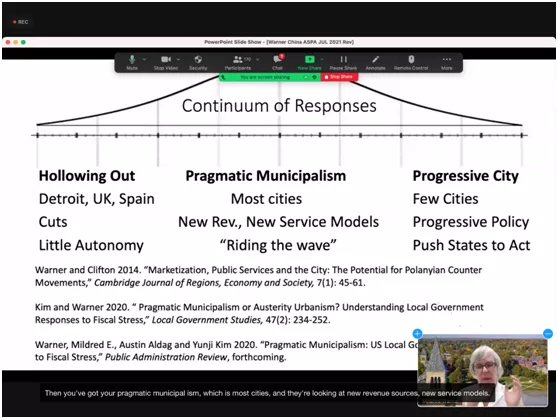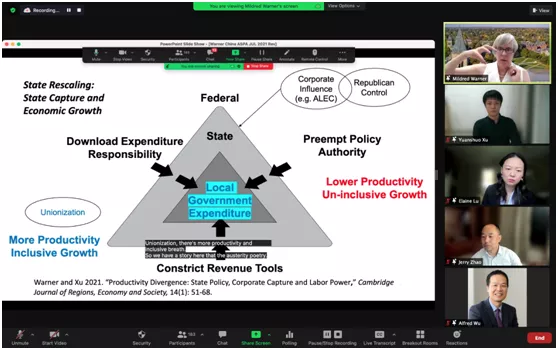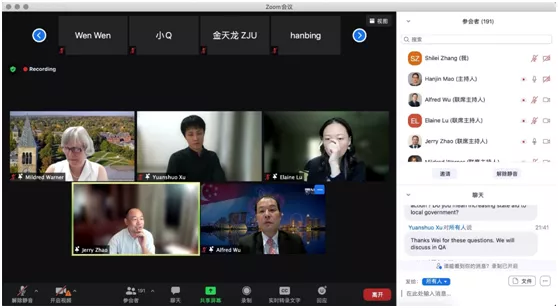On July 6, 2021, Professor Mildred Warner of Cornell University's Department of Urban and Regional Planning was invited to participate in the China-US Public Affairs Scholars' Dialogue series which is jointly organized by Zhejiang University's School of Public Affairs as well as the American Society for Public Administration (ASPA) China Chapter. As the guest speaker of the first session of the series, Professor Warner shared his research on the theme of U.S. Local Government Responses to the Financial Crisis: Austerity Urbanism or Pragmatic Municipalism with the audience.
Firstly, on behalf of the organizers of the event, Prof. Lu Yi of the City University of New York, president of the American Society for Public Administration (ASPA) China Chapter, gave a brief introduction of the series of events. The China-US Public Affairs Scholars Dialogue series aims to promote the development of public administration disciplines by inviting renowned scholars from China and the United States to exchange each other's views on current public affairs issues of common concern around the world. Professor Zhao Zhirong, Dean of the School of Public Affairs of Zhejiang University, was the guest speaker. Professor Wu MuLuan, Vice Dean of the Lee Kuan Yew School of Public Policy of the National University of Singapore, and Dr. Xu Yuanshuo, Researcher of the Department of the 100 Person Plan of the School of Public Affairs of Zhejiang University, also participated in the activi as moderators. The online event brought nearly 200 scholars from all over the world to participate.
Professor Warner put forward the pop theory of local response to crisis, including Austerity Urbanism, Pragmatic Municipalism, and Progressive City, which dominate the discourse in the West. Professor Warner noted that in reality, most cities tend to choose more pragmatic strategies, including efforts to balance financial pressures, economic growth, and the needs of their citizens; cities also make efforts to open up new avenues of financial revenue, and to innovate alternative public services, etc. He pointed out that the problem of austerity urbanism has been a major problem.

Next, Professor Warner further explained three major factors that influence local coping patterns: structural pressures (state-local policies), economic pressures, and population pressures. He argued that structural pressures are most important. The pressure of state-local relations is characterized by the scalar dumping of state government decentralization, in which decentralization is accompanied by reductions in subsidies, exacerbating the mismatch between local financial power and decentralization. Though these three pressures vary spatially across regions, they all affect the coping strategies of local governments to varying degrees and may lead to non-inclusive urban growth over time.

Professor Warner argued that Pragmatic Municipalism can guide local governments to walk out of the vicious circle of austerity urbanism. Therefore, reducing pressure on local governments is the most direct way to change the current situation. Professor Warner further suggested that the actions of the federal and state governments in responding to COVID-19 may be an opportunity for local governments to move away from Austerity Urbanism and to move towards a more progressive city from pragmatic city doctrine.

After the sharing, Professor Zhao Zhirong from School of Public Affairs of Zhejiang University made a wonderful comment. He pointed out that the financial problems faced by local governments are an interdisciplinary field of study and a global issue. Existing theories do not yet respond well to the above-mentioned real-life concerns, so scholars from different countries can work together to summarize useful experiences and cooperate to improve existing theories so as to better guide practical development.
At the end of the lecture, Professor Warner answered the questions raised by the scholars and had an in-depth discussion with the participants. The dialogue between Chinese and American public affairs scholars ended successfully in a warm atmosphere.
Introduction: Mildred E. Warner is a professor in the Department of Urban and Regional Planning at Cornell University, U.S.A. Professor Warner's main research areas are local government finance, public services, local economy, and environmental and social policy, and she focuses on the restructuring of state-local relations in the context of marketization, decentralization, and economic crisis. She explores the marketization mechanism of public services, and points out that we need to be vigilant against the possible unfairness caused by the market mechanism. Her research reveals the role of public services as a social infrastructure in development. Professor Warner also proposes a multigenerational model of community planning and development. Professor Warner has published more than 200 papers in public administration review, Journal of public administration, research and theory, Cambridge Journal of Regions economy and society, environment and planning a, Journal of planning education and research, Journal of the American Planning Association and other journals.


